六年级的的下苏教版译林英语U1语法重点.docx
- 格式:docx
- 大小:13.71 KB
- 文档页数:3
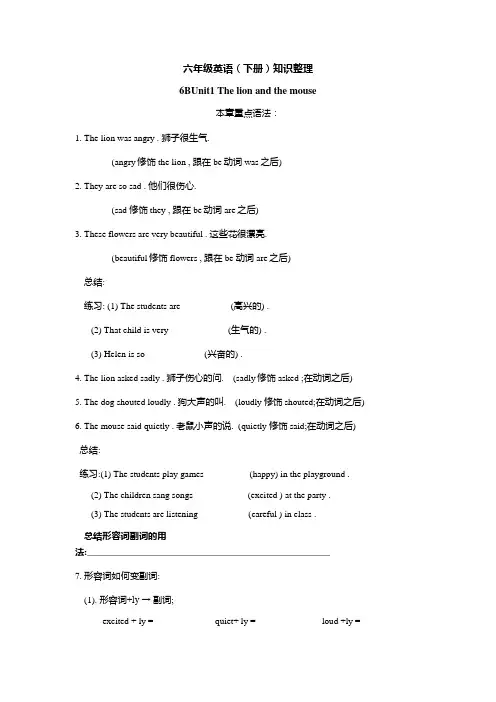
六年级英语(下册)知识整理6BUnit1 The lion and the mouse本章重点语法:1. The lion was angry . 狮子很生气.(angry修饰the lion , 跟在be动词was之后)2. They are so sad . 他们很伤心.(sad 修饰they , 跟在be动词are之后)3. These flowers are very beautiful . 这些花很漂亮.(beautiful修饰flowers , 跟在be 动词are之后)总结:_______________________________________________练习: (1) The students are __________ (高兴的) .(2) That child is very ____________ (生气的) .(3) Helen is so ____________ (兴奋的) .4. The lion asked sadly . 狮子伤心的问. (sadly修饰asked ;在动词之后)5. The dog shouted loudly . 狗大声的叫. (loudly 修饰 shouted;在动词之后)6. The mouse said quietly . 老鼠小声的说. (quietly 修饰 said;在动词之后)总结:__________________________________________________练习:(1) The students play games _________ (happy) in the playground .(2) The children sang songs ___________ (excited ) at the party .(3) The students are listening __________ (careful ) in class .总结形容词副词的用法:_____________________________________________________7. 形容词如何变副词:(1). 形容词+ly → 副词;excited + ly = ___________ quiet+ ly = ____________ loud +ly = ___________sad + ly = ___________ careful + ly = ___________beautiful + ly = ____________ quick + ly = ________________ slow + ly = ________________(2). 以”辅音字母+y结尾”变y为ily ;happy → ___________ angry → _____________(3). 不规则; good → _____________8.综合操练:(1) Don’t laugh __________ (loud) in the library .(2) Please speak ___________ (loud) .(3) She and her classmates dance ___________ (beautiful) .(4) Helen is sitting ____________ (quiet) on the grass .(5) The woman was very __________ . She was crying __________ (sad) .(6) The lion became _________ . He shouted ___________ (angry) .(7) The boy is singing ___________ (excited) .(8) Please be __________ (quiet) . Sit __________ (quiet ) , class .(9) She is a _________ (happy) girl . She plays ___________ (happy) every day .(10) The woman was very _________ (sad) . She was crying _________ (sad) .(11) The lion became __________ (angry). He shouted __________ (angry) .复习重点语法:一般过去时1.关键词(key words): ……ago , yesterday , the day before yesterday (前天) , just now (刚刚) ,one day(一天) , last week/year/night/month , just then , from then on (从那时起) , this morning2.结构: 主语+was/were +其他. 主语+动词(过去式)+其他.否定: 主语+was/were+not +其他. 否定: 主语+didn’t +动词(原型)+其他.疑问: Was/Were +主语+其他? 疑问: Did+ 主语+动词(原型)+其他?肯回: Yes , 主语+was/were . 肯回:Yes , 主语+did .否回: No , 主语+was/were+ not . 否回:No , 主语+didn’t .3.不规则变化的动词过去式:(1) 与原型相同:let , hit , cut , put , hurt , read(2) 改变元音:meet → met , get → got , sit → sat , come → came , drink → drank ,sing → sang , swim → swam , know → knew , draw → drew(3) 其他:bring → brought, buy → bought , catch → caught , teach → taught ,say → said , tell → told1. I was a student two years ago .2. Two men caught the lion .否:_____________________________ 否:_______________________________ 疑:_____________________________ 疑:_______________________________肯回:__________________________ 肯回:_____________________________否回:__________________________ 否回:_____________________________ 3. He let the mouse go. 4.There were some flowers on the hill .否:_____________________________ 否:_______________________________ 疑:_____________________________ 疑:_______________________________肯回:__________________________ 肯回:_____________________________否回:__________________________ 否回:_____________________________5. 狗咬段了绳子,并且逃跑了。
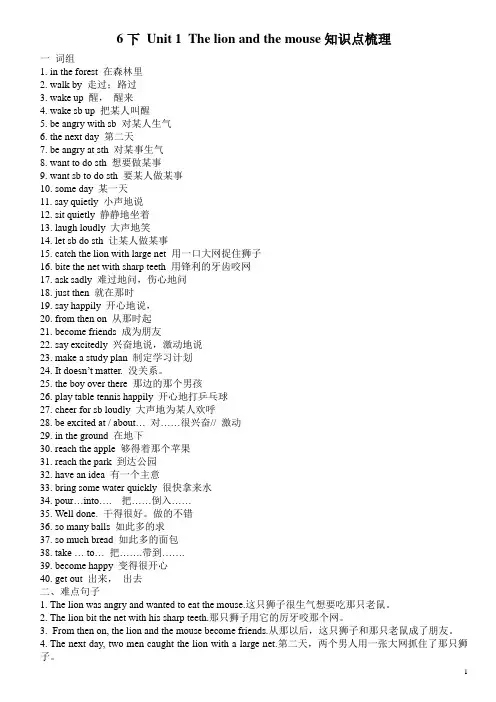
6下Unit 1 The lion and the mouse知识点梳理一词组1. in the forest 在森林里2. walk by 走过;路过3. wake up 醒,醒来4. wake sb up 把某人叫醒5. be angry with sb 对某人生气6. the next day 第二天7. be angry at sth 对某事生气8. want to do sth 想要做某事9. want sb to do sth 要某人做某事10. some day 某一天11. say quietly 小声地说12. sit quietly 静静地坐着13. laugh loudly 大声地笑14. let sb do sth 让某人做某事15. catch the lion with large net 用一口大网捉住狮子16. bite the net with sharp teeth 用锋利的牙齿咬网17. ask sadly 难过地问,伤心地问18. just then 就在那时19. say happily 开心地说,20. from then on 从那时起21. become friends 成为朋友22. say excitedly 兴奋地说,激动地说23. make a study plan 制定学习计划24. It doesn’t matter. 没关系。
25. the boy over there 那边的那个男孩26. play table tennis happily 开心地打乒乓球27. cheer for sb loudly 大声地为某人欢呼28. be excited at / about… 对……很兴奋// 激动29. in the ground 在地下30. reach the apple 够得着那个苹果31. reach the park 到达公园32. have an idea 有一个主意33. bring some water quickly 很快拿来水34. pour…into….把……倒入……35. Well done. 干得很好。
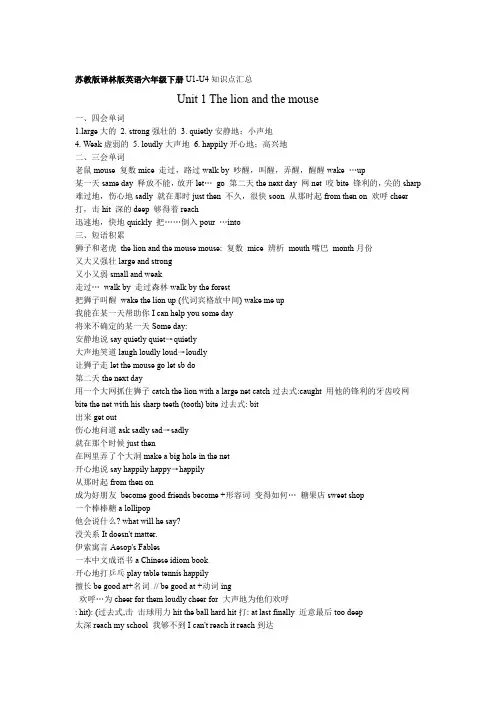
苏教版译林版英语六年级下册U1-U4知识点汇总Unit 1 The lion and the mouse一、四会单词rge大的2. strong强壮的3. quietly安静地;小声地4. Weak虚弱的5. loudly大声地6. happily开心地;高兴地二、三会单词老鼠mouse 复数mice 走过,路过walk by 吵醒,叫醒,弄醒,醒醒wake …up某一天same day 释放不能,放开let…go 第二天the next day 网net 咬bite 锋利的,尖的sharp 难过地,伤心地sadly 就在那时just then 不久,很快soon 从那时起from then on 欢呼cheer 打,击hit 深的deep 够得着reach迅速地,快地quickly 把……倒入pour …into三、短语积累狮子和老虎the lion and the mouse mouse: 复数mice 辨析mouth嘴巴month月份又大又强壮large and strong又小又弱small and weak走过…walk by 走过森林walk by the forest把狮子叫醒wake the lion up (代词宾格放中间) wake me up我能在某一天帮助你I can help you some day将来不确定的某一天Some day:安静地说say quietly quiet→quietly大声地笑道laugh loudly loud→loudly让狮子走let the mouse go let sb do第二天the next day用一个大网抓住狮子catch the lion with a large net catch过去式:caught 用他的锋利的牙齿咬网bite the net with his sharp teeth (tooth) bite过去式: bit出来get out伤心地问道ask sadly sad→sadly就在那个时候just then在网里弄了个大洞make a big hole in the net开心地说say happily happy→happily从那时起from then on成为好朋友become good friends become +形容词变得如何…糖果店sweet shop一个棒棒糖a lollipop他会说什么? what will he say?没关系It doesn't matter.伊索寓言Aesop's Fables一本中文成语书a Chinese idiom book开心地打乒乓play table tennis happily擅长be good at+名词// be good at +动词ing欢呼…为cheer for them loudly cheer for 大声地为他们欢呼: hit): (过去式,击击球用力hit the ball hard hit打: at last finally 近意最后too deep太深reach my school 我够不到I can't reach it reach到达bring some water quickly 迅速地拿一些水来pour it in the hole 把它倒进洞里! Well done! 干得好四、四会句子The mouse said quietly. 狮子大声地笑。
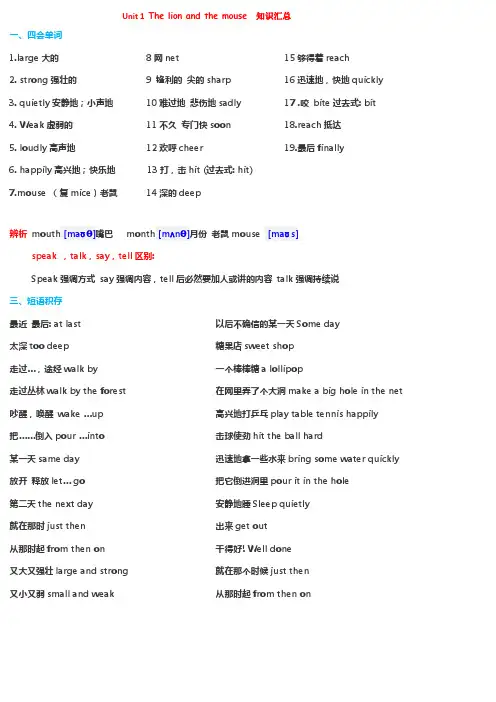
Unit 1 The lion and the mouse知识汇总一、四会单词rge大的2. strong强壮的3. quietly安静地;小声地4. Weak虚弱的5. loudly高声地6. happily高兴地;快乐地7.mouse (复mice)老鼠8网net9 锋利的尖的sharp10难过地悲伤地sadly11不久专门快soon12欢呼cheer13打,击hit (过去式: hit)14深的deep15够得着reach16迅速地,快地quickly17 .咬bite过去式: bit18.reach抵达19.最后finally辨析mouth [maʊθ]嘴巴month [mʌnθ]月份老鼠mouse [maʊs] speak ,talk,say,tell区别:Speak强调方式say强调内容,tell后必然要加人或讲的内容talk强调持续说三、短语积存最近最后: at last太深too deep走过…,途经walk by走过丛林walk by the forest 吵醒,唤醒wake …up 把……倒入pour …into某一天same day放开释放let… go第二天the next day就在那时just then从那时起from then on又大又强壮large and strong 又小又弱small and weak 以后不确信的某一天Some day糖果店sweet shop一个棒棒糖a lollipop在网里弄了个大洞make a big hole in the net 高兴地打乒乓play table tennis happily击球使劲hit the ball hard迅速地拿一些水来bring some water quickly 把它倒进洞里pour it in the hole安静地睡Sleep quietly出来get out干得好! Well done就在那个时候just then从那时起from then on他会说什么? what will he say?没关系It doesn’t matter.伊索寓言Aesop’s Fables高兴地说say happily狮子和老鼠the lion and the mouse 一本中文成语书a Chinese idiom book 安静地说say quietly quiet→quietly 高声地笑道laugh loudly loud→loudly 让老鼠走let the mouse go let sb do 悲伤地问道ask sadly sad→sadly用一个大网抓住狮子catch the lion with a large net (catch过去式:caught)把狮子唤醒wake the lion up (代词宾格放中间) wake me up用他的锋利的牙齿咬网bite the net with his sharp teeth (tooth) become +形容词变得如何… 成为宜朋友become good friends擅长be good at+名词// be good at +动词ing高声地为他们欢呼cheer for them loudly cheer for为…欢呼我够不到I can’t reach it reach my school四、四会句子The mouce said quietly. 老鼠小声地说。
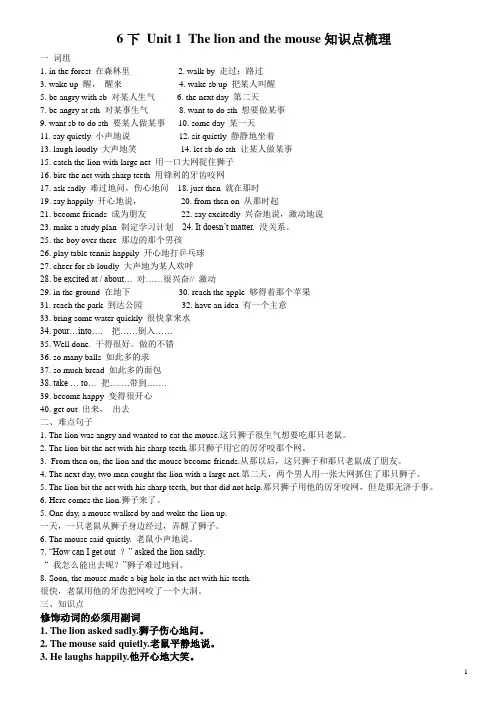
6下Unit 1 The lion and the mouse知识点梳理一词组1. in the forest 在森林里2. walk by 走过;路过3. wake up 醒,醒来4. wake sb up 把某人叫醒5. be angry with sb 对某人生气6. the next day 第二天7. be angry at sth 对某事生气8. want to do sth 想要做某事9. want sb to do sth 要某人做某事10. some day 某一天11. say quietly 小声地说 12. sit quietly 静静地坐着13. laugh loudly 大声地笑14. let sb do sth 让某人做某事15. catch the lion with large net 用一口大网捉住狮子16. bite the net with sharp teeth 用锋利的牙齿咬网17. ask sadly 难过地问,伤心地问18. just then 就在那时19. say happily 开心地说,20. from then on 从那时起21. become friends 成为朋友22. say excitedly 兴奋地说,激动地说23. make a study plan 制定学习计划24. It doesn’t matter. 没关系。
25. the boy over there 那边的那个男孩26. play table tennis happily 开心地打乒乓球27. cheer for sb loudly 大声地为某人欢呼28. be excited at / about… 对……很兴奋// 激动29. in the ground 在地下 30. reach the apple 够得着那个苹果31. reach the park 到达公园32. have an idea 有一个主意33. bring some water quickly 很快拿来水34. pour…into….把……倒入……35. Well done. 干得很好。
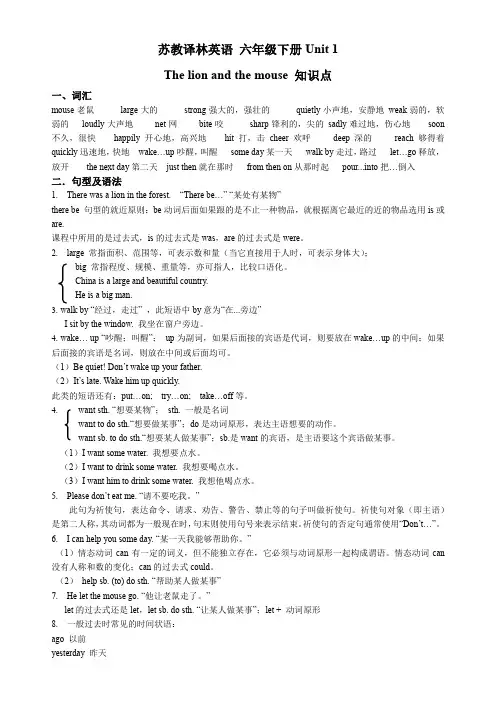
苏教译林英语 六年级下册Unit 1 The lion and the mouse 知识点一、词汇mouse 老鼠 large 大的 strong 强大的,强壮的 quietly 小声地,安静地 weak 弱的,软弱的 loudly 大声地 net 网 bite 咬 sharp 锋利的,尖的 sadly 难过地,伤心地 soon 不久,很快 happily 开心地,高兴地 hit 打,击 cheer 欢呼 deep 深的 reach 够得着 quickly 迅速地,快地 wake…up 吵醒,叫醒 some day 某一天 walk by 走过,路过 let…go 释放,放开 the next day 第二天 just then 就在那时 from then on 从那时起 pour...into 把…倒入二.句型及语法1. There was a lion in the forest. “There be…” “某处有某物”there be 句型的就近原则:be 动词后面如果跟的是不止一种物品,就根据离它最近的近的物品选用is 或are.课程中所用的是过去式,is 的过去式是was ,are 的过去式是were 。
2. large 常指面积、范围等,可表示数和量(当它直接用于人时,可表示身体大);big 常指程度、规模、重量等,亦可指人,比较口语化。
China is a large and beautiful country. He is a big man.3. walk by “经过,走过” ,此短语中by 意为“在...旁边” I sit by the window. 我坐在窗户旁边。
4. wake… up “吵醒;叫醒”; up 为副词,如果后面接的宾语是代词,则要放在wake…up 的中间;如果后面接的宾语是名词,则放在中间或后面均可。
(1)Be quiet! Don’t wake up your father. (2)It’s late. Wake him up quickly.此类的短语还有:put…on; try…on; take…off 等。
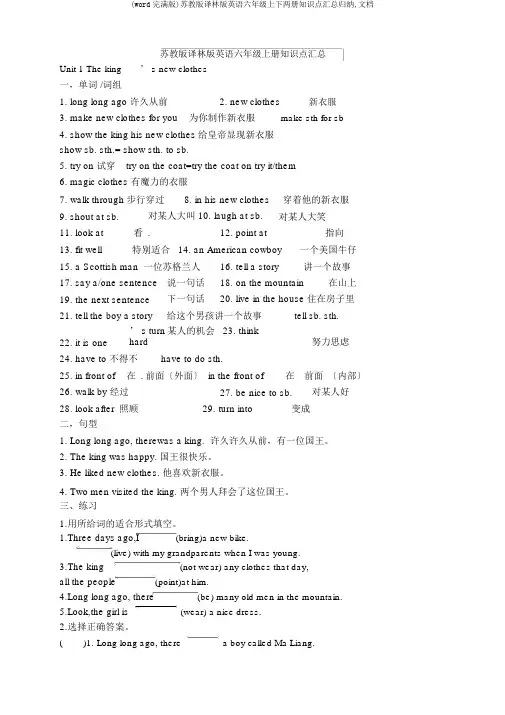
苏教版译林版英语六年级上册知识点汇总Unit 1 The king’ s new clothes一,单词 /词组1. long long ago 许久从前2. new clothes新衣服3. make new clothes for you为你制作新衣服make sth for sb4. show the king his new clothes给皇帝显现新衣服show sb. sth.= show sth. to sb.5.try on 试穿 try on the coat=try the coat on try it/them6.magic clothes 有魔力的衣服7. walk through 步行穿过8. in his new clothes穿着他的新衣服9. shout at sb.对某人大叫 10. laugh at sb.对某人大笑11. look at看 .12. point at指向13. fit well特别适合 14. an American cowboy一个美国牛仔15. a Scottish man 一位苏格兰人16. tell a story讲一个故事17. say a/one sentence说一句话18. on the mountain在山上19. the next sentence下一句话20. live in the house 住在房子里21. tell the boy a story给这个男孩讲一个故事tell sb. sth.22. it is one ’ s turn某人的机会 23. thinkhard努力思虑24. have to 不得不have to do sth.25. in front of在 .前面〔外面〕 in the front of在前面〔内部〕26. walk by 经过27. be nice to sb.对某人好28. look after照顾29. turn into变成二,句型1.Long long ago, therewas a king. 许久许久从前,有一位国王。
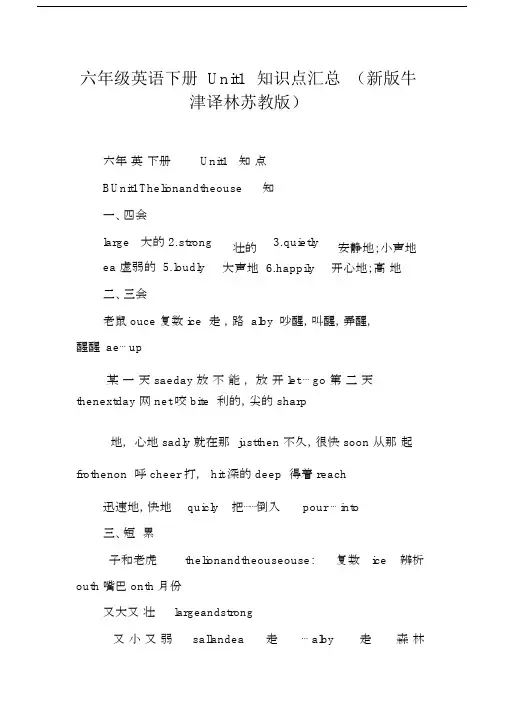
六年级英语下册 Unit1 知识点汇总(新版牛津译林苏教版)六年英下册Unit1知点BUnit1Thelionandtheouse知一、四会large大的2.strong ea 虚弱的 5.loudly壮的大声地3.quietly6.happily安静地;小声地开心地;高地二、三会老鼠 ouce 复数 ice 走,路 alby 吵醒,叫醒,弄醒,醒醒ae⋯ up某一天 saeday 放不能,放开 let ⋯ go 第二天thenextday 网 net 咬 bite 利的,尖的 sharp地,心地 sadly 就在那 justthen 不久,很快 soon 从那起frothenon 呼 cheer 打, hit 深的 deep 得着 reach迅速地,快地quicly把⋯⋯倒入pour ⋯ into三、短累子和老虎thelionandtheouseouse:复数ice辨析outh 嘴巴 onth 月份又大又壮largeandstrong又小又弱sallandea走⋯alby走森林albytheforest把子叫醒aethelionupaeeup我能在某一天帮助你Icanhelpyousoeda将来不确定的某一天Soeday:安静地 sayquietlyquiet→ quietl大声地笑道laughloudlyloud→ loudl子走 lettheousegoletsbdo第二天 thenextda用一个大网抓住子catchthelionithalargenetcatch去式:caught 用他的利的牙咬网bitethenetithhissharpteethbite 去式:bit出来getout心地道assadlysad →sadl就在那个候justthen在网里弄了个大洞aeabigholeinthenet开心地 sayhappilyhappy→ happil从那起 frothenon成好朋友beegoodfriendsbee+形容得如何⋯糖果店 seetshop一个棒棒糖alollipop他会什么 ?hatillhesay?没关系 Itdoesn ’tatter.伊索寓言 Aesop’sFables一本中文成achineseidioboo 开心地打playtabletennishappil擅 begoodat+ 名 //begoodat+ing大声地他呼cheerfortheloudlycheerfor ⋯呼球用力 hittheballhardhit打, :最后 finally近意:atlast太深 toodeep我不到 Ican ’treachitreach 到达 reachyschool 迅速地拿一些水来 bringsoeaterquicl 把它倒洞里pouritinthehole干得好 !elldone!四、四会句子Theoucesaidquietly.老鼠小声地。
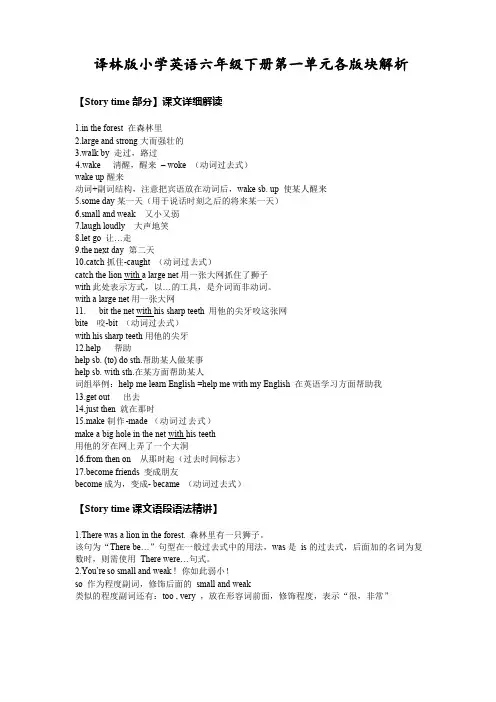
译林版小学英语六年级下册第一单元各版块解析【Story time部分】课文详细解读1.in the forest在森林里rge and strong大而强壮的3.walk by走过,路过4.wake清醒,醒来–woke(动词过去式)wake up醒来动词+副词结构,注意把宾语放在动词后,wake sb.up使某人醒来5.some day某一天(用于说话时刻之后的将来某一天)6.small and weak又小又弱ugh loudly大声地笑8.let go让…走9.the next day第二天10.catch抓住-caught(动词过去式)catch the lion with a large net用一张大网抓住了狮子with此处表示方式,以…的工具,是介词而非动词。
with a large net用一张大网11.bit the net with his sharp teeth用他的尖牙咬这张网bite咬-bit(动词过去式)with his sharp teeth用他的尖牙12.help帮助help sb.(to)do sth.帮助某人做某事help sb.with sth.在某方面帮助某人词组举例:help me learn English=help me with my English在英语学习方面帮助我13.get out出去14.just then就在那时15.make制作-made(动词过去式)make a big hole in the net with his teeth用他的牙在网上弄了一个大洞16.from then on从那时起(过去时间标志)17.become friends变成朋友become成为,变成-became(动词过去式)【Story time课文语段语法精讲】1.There was a lion in the forest.森林里有一只狮子。
该句为“There be…”句型在一般过去式中的用法,was是is的过去式,后面加的名词为复数时,则需使用There were…句式。
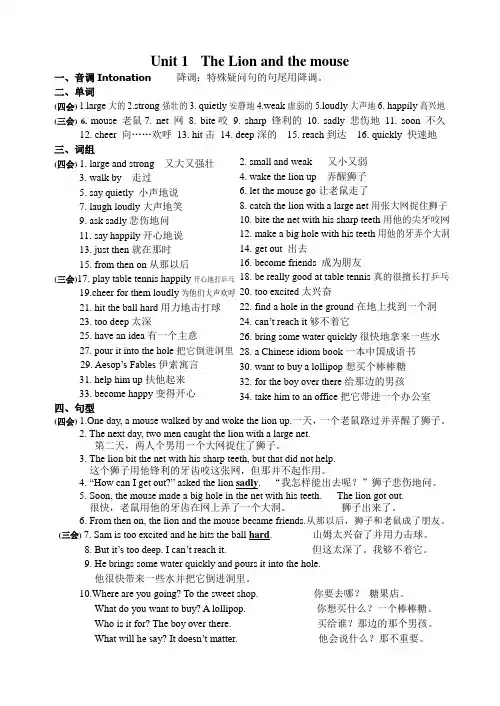
Unit 1 The Lion and the mouse一、音调Intonation 降调:特殊疑问句的句尾用降调。
二、单词(四会) rge 大的2.strong 强壮的3. quietly 安静地4.weak 虚弱的5.loudly 大声地6. happily 高兴地 (三会) 6. mouse 老鼠7. net 网 8. bite 咬 9. sharp 锋利的 10. sadly 悲伤地 11. soon 不久12. cheer 向……欢呼 13. hit 击 14. deep 深的 15. reach 到达 16. quickly 快速地三、词组(四会) 1. large and strong 又大又强壮3. walk by 走过5. say quietly 小声地说7. laugh loudly 大声地笑9. ask sadly 悲伤地问11. say happily 开心地说13. just then 就在那时15. from then on 从那以后(三会)17. play table tennis happily 开心地打乒乓 19.cheer for them loudly 为他们大声欢呼 21. hit the ball hard 用力地击打球23. too deep 太深 25. have an idea 有一个主意 27. pour it into the hole 把它倒进洞里 29. Aesop’s Fables 伊索寓言 31. help him up 扶他起来 33. become happy 变得开心 四、句型 (四会) 1.One day, a mouse walked by and woke the lion up.一天,一个老鼠路过并弄醒了狮子。
2. The next day, two men caught the lion with a large net.第二天,两人个男用一个大网捉住了狮子。
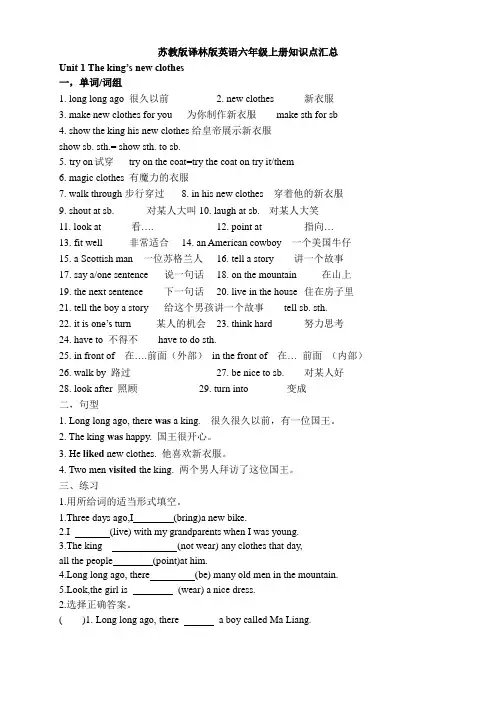
苏教版译林版英语六年级上册知识点汇总Unit 1 The king’s new clothes一,单词/词组1. long long ago 很久以前2. new clothes 新衣服3. make new clothes for you 为你制作新衣服make sth for sb4. show the king his new clothes给皇帝展示新衣服show sb. sth.= show sth. to sb.5.try on 试穿try on the coat=try the coat on try it/them6. magic clothes 有魔力的衣服7. walk through步行穿过8. in his new clothes 穿着他的新衣服9. shout at sb. 对某人大叫 10. laugh at sb. 对某人大笑11. look at 看….12. point at 指向…13. fit well 非常适合14. an American cowboy 一个美国牛仔15. a Scottish man 一位苏格兰人16. tell a story 讲一个故事17. say a/one sentence 说一句话18. on the mountain 在山上19. the next sentence 下一句话20. live in the house 住在房子里21. tell the boy a story 给这个男孩讲一个故事tell sb. sth.22. it is one’s turn 某人的机会23. think hard 努力思考24. have to 不得不have to do sth.25. in front of 在….前面(外部)in the front of 在… 前面(内部)26. walk by 路过27. be nice to sb. 对某人好28. look after 照顾29. turn into 变成二,句型1. Long long ago, there was a king. 很久很久以前,有一位国王。
六年级下册英语Unit1知识点整理(译林版)Unit1Thelionandthemouse知识汇总【词汇】rge大的2.strong强壮的3.quietly安静地;小声地4.weak虚弱的5.loudly大声地6.happily开心地,高兴地7.mouce 老鼠 8.walkby走过,路过9. wake…up吵醒,叫醒,弄醒,醒醒10.someday某一天11.let…go放开12.thenextday第二天 网14.bite 咬 15.sharp锋利的,尖的16.sadly难过地,伤心地 17. justthen 就在那时18.soon 不久,很快 19.fromthenon 从那时起20. cheer 欢呼 21.hit打,击22.deep 深的 23.reach够得着24.quickly 迅速地,快地25.pour…into把……倒入【词组短语】狮子和老虎 thelionandthemouse [mouse: 复数 mice 辨析 mouth嘴巴 month月份] 又大又强壮largeandstrong又小又弱smallandweak走过… walkby走过森林walkbytheforest把狮子叫醒 wakethelionup wakeme(代词宾格放中间)up [wake过去式:woke]我能在某一天帮助你Icanhelpyousomeday将来不确定的某一天someday安静地说sayquietly [quiet→quietly]大声地笑道laughloudly [loud→loudly]让狮子走letthemousego [letsbdo,let过去式:let]第二天thenextday用一个大网抓住狮子catchthelionwithalargenet [catch过去式:caught]用他的锋利的牙齿咬网 bitethenetwithhissharpteeth [teeth单数:tooth bite过去式:bit] 出来getout伤心地问道asksadly [sad→sadly]就在那个时候justthen在网里弄了个大洞makeabigholeinthenet开心地说sayhappily [happy→happily]从那时起fromthenon成为好朋友 becomegoodfriends [become+形容词:变得...,变成.... ]糖果店sweetshop一个棒棒糖alollipop他会说什么whatwillhesay没关系Itdoesn’tmatter.伊索寓言Aesop’sFables一本中文成语书aChineseidiombook开心地打乒乓playtabletennishappily擅长begoodat+名词 //begoodat+动词ing大声地为他们欢呼 cheerforthemloudly cheerfor为…欢呼击球用力hittheballhard hit打,击 [过去式:hit]最后finally [近意:atlast]太深toodeep我够不到Ican’treachit [reach到达 reachmyschool]迅速地拿一些水来bringsomewaterquickly把它倒进洞里pouritinthehole干得好!Welldone!【句型】1.Themoucesaidquietly. 老鼠小声地说。
译林版六年级英语下册Unit1-8全册知识点汇总译林版六年级英语下册Unit 1知识点汇总词汇分类形容词:large 大的strong 强大的,强壮的weak 弱的,软弱的sharp 锋利的,尖的deep 深的副词:quietly 小声地,安静地loudly大声地sadly难过地,伤心地happily开心地,高兴地quickly迅速地,快地soon 不久,很快动词:bite 咬cheer 欢呼hit 打,击reach 够得着名词:mouse 老鼠net 网短语1. walk by 走过,路过2. wake... up 吵醒,叫醒3. eat the mouse 吃这只老鼠4.be good at 擅长5. let... go 释放,放开6. pour... into 把...倒人7. in the forest 在森林里8. some day 某一天9. become friends 成了朋友10. the next day 第二天11. just then 就在那时12. from then on 从那时起13. make a big hole 弄一个大洞14. so small and weak 这么弱小15. very large and strong 非常大并且强壮惯用表达式1. How can you help me? 你能怎么帮助我?2. Thank you! 谢谢你!3. Thanks. 谢谢。
4. Hooray! 好哇!5. Well done! 做得好!知识点精析1. 描述他人的体貌特征的句型—…is/was…【课文应用】He was very large and strong.他非常大并且强壮。
【句型结构】主语(第三人称单数)+is/was+形容词【重点解析】因为主语为第三人称单数,所以be 动词用is 或was。
该句型中的形容词用来形容他人的体貌特征,如fat,small,weak,thin 等。
苏教版译林版英语六年级下册U1-U4知识点汇总Unit 1 The lion and the mouse一、四会单词rge大的2. strong强壮的3. quietly安静地;小声地4. Weak虚弱的5. loudly大声地6. happily开心地;高兴地二、三会单词老鼠mouse 复数mice 走过,路过walk by 吵醒,叫醒,弄醒,醒醒wake …up某一天same day 释放不能,放开let… go 第二天the next day 网net 咬bite 锋利的,尖的sharp难过地,伤心地sadly 就在那时just then 不久,很快soon 从那时起from then on 欢呼cheer 打,击hit 深的deep 够得着reach迅速地,快地quickly 把……倒入pour …into三、短语积累狮子和老虎 the lion and the mouse mouse: 复数 mice 辨析 mouth嘴巴 month月份又大又强壮large and strong又小又弱small and weak走过… walk by 走过森林walk by the forest把狮子叫醒 wake the lion up (代词宾格放中间) wake me up我能在某一天帮助你I can help you some day将来不确定的某一天Some day:安静地说say quietly quiet→quietly大声地笑道laugh loudly loud→loudly让狮子走let the mouse go let sb do第二天the next day用一个大网抓住狮子catch the lion with a large net catch过去式:caught 用他的锋利的牙齿咬网 bite the net with his sharp teeth (tooth) bite过去式: bit出来get out伤心地问道ask sadly sad→sadly就在那个时候just then在网里弄了个大洞make a big hole in the net开心地说say happily happy→happily从那时起from then on成为好朋友 become good friends become +形容词变得如何… 糖果店sweet shop一个棒棒糖a lollipop他会说什么? what will he say?没关系It doesn’t matter.伊索寓言Aesop’s Fables一本中文成语书a Chinese idiom book开心地打乒乓play table tennis happily擅长be good at+名词 // be good at +动词ing大声地为他们欢呼 cheer for them loudly cheer for为…欢呼击球用力hit the ball hard hit打,击 (过去式: hit):最后finally 近意: at last太深too deep我够不到I can’t reach it reach到达 reach my school迅速地拿一些水来bring some water quickly把它倒进洞里pour it in the hole干得好! Well done!四、四会句子The mouse said quietly. 老鼠小声地说。
Unit 1 The lion and the mouse一、四会单词大的 2. strong强壮的 3. quietly安静地;小声地4. Weak虚弱的5. loudly大声地6. happily开心地;高兴地二、三会单词老鼠mouse 复数mice 走过,路过walk by 吵醒,叫醒,弄醒,醒醒wake …up某一天same day 释放不能,放开let… go 第二天the next day 网net 咬bite 锋利的,尖的sharp难过地,伤心地sadly 就在那时just then 不久,很快soon 从那时起from then on 欢呼cheer 打,击hit 深的deep 够得着reach迅速地,快地quickly 把……倒入pour …into三、短语积累狮子和老虎 the lion and the mouse mouse: 复数 mice 辨析 mouth嘴巴 month月份又大又强壮large and strong又小又弱small and weak走过… walk by 走过森林walk by the forest把狮子叫醒 wake the lion up (代词宾格放中间) wake me up我能在某一天帮助你I can help you some day将来不确定的某一天Some day:安静地说say quietly quiet→quietly大声地笑道laugh loudly loud→loudly让狮子走let the mouse go let sb do第二天the next day用一个大网抓住狮子catch the lion with a large net catch过去式:caught 用他的锋利的牙齿咬网 bite the net with his sharp teeth (tooth) bite过去式: bit出来get out伤心地问道ask sadly sad→sadly就在那个时候just then在网里弄了个大洞make a big hole in the net开心地说say happily happy→happily从那时起from then on成为好朋友 become good friends become +形容词变得如何… 糖果店sweet shop一个棒棒糖a lollipop他会说什么? what will he say?没关系It doesn’t matter.伊索寓言Aesop’s Fables一本中文成语书a Chinese idiom book开心地打乒乓play table tennis happily擅长be good at+名词老鼠小声地说。
U1必会词(要求:1、在书上用彩色笔勾画出来,并做好笔记。
尤其是“彩色字体”“补充”和括号里的内容。
2、列出的50个词组分布在Unit1各个板块,一定要边看书边笔记,提高自主学习的效率。
3、并非每个词组都给出了中文翻译,可以根据自己情况补充,不理解的可以给老师QQ留言。
特殊时期,我们一起加油!)1.There be句型(注意就近原则)2.in the forestrge and strong (large=big)反义词small and weak4.one day 某天(多用于过去时)5.some day 某天(多用于将来时)6.the next day 第二天7.just then 正在那时8.from then on 从那时起,多用于过去时(补充:from now on从今以后,多用于将来时)9.walk by 走过,路过10.wake sb. up(注意wake和walk读音上和拼写上的区分)11.be angry (be+形容词)12.want to eat the mouse(13.say quiet lyugh loud ly行为动词+副词15.ask sadly(感官动词+形容词)16.say happ ily17.let the mouse go(let+宾格+动词原形)18.catch the lion with a large net19.bite the net with his sharp teeth20.make a big hole in the net with his teethdo A with B= use B to do A (如catch the lion with a large net = use a large net to catch the lion)21.that did not help= that did not work 没有任何帮助、不起任何作用22.How can I get out?23.become friend s 成为朋友24.Here comes the lion. 代词倒装Here comes the bus. Here it comes.25.Don’t be afraid.26.lollipop27.the sweet shop28.over there 在那里29.It doesn’t matter. 没关系。
第一单元语法重点【语法】
一、副词
在旧教材5BUnit4 里学生已经学过了一些副词,师们可以将以前学过的一些内容给学生复习一下。
所以本单元的语法对学生来说并不陌生。
老如:dance beautifully, sit quietly,run fast,
walk carefully,jump high
1. 副词( Adverb )是指在句子中表示行为或状态特征的词,是一类用以修饰动词语的 verb)或加强描绘词组或整个句子的词。
目前我们学过的副词有:
时间副词: now, then, often, always ,usually, early, today, next, soon, too, finally, sometimes, yesterday
地点副词: here, there, in, out, inside, home, around, near, off, past, up, away, on.
(相当于英before, ago,
方式副词: carefully, fast, well, slowly, hard, quietly, loudly, sadly, happily
程度副词: much, very, so, too, quite.
疑问副词: how, when, where, why.
表顺序的副词:first, then ,next, finally
2.副词在句中可作状语、表语、补语、定语。
1)在许多情况下,副词都放在所修饰的动词后面或句末。
如:
The girl dances very well. 这个女孩跳舞跳得好。
We must work hard. 我们必须努力工作。
He does his work very carefully . 他做工作非常仔细。
I
want to see the film very much . 我很想看这部电影。
2)有时也放在主语后面,谓语动词前面(对动作加以强调 )。
如:
He angrily closed the door. 他生气地把门关上了。
3)置于句中的副词,若碰上助动词,则通常放在助动词之后、主要动词之前:
He is often late for school.他经常上学迟到。
He can also play basketball. 他还会打篮球。
3.本教材中主要学习由形容词变副词的方法和用法。
形容词变副词的规则:
1)一般情况下直接加“ ly,”如quick—quickly
2)以“ y结”尾的 , 先将“ y改”成“ i 再”,加“ ly,”如 happy— happily 少数以 e 结尾的形容词,要去掉 e 再加 -ly 。
例如: true(正确的)— truly 等。
但绝大多数以 e 结尾的形容词仍然直接加-ly 。
例如: polite (礼貌的)— politely等。
3)在英语中, 有些词既可以作形容词, 又可以作副词, 如early, much, fast, little, hard等。
4)还有一类副词和形容词词义相同, 但拼写却不同 , 如 well 和 good。
如:He speaks good English. 他讲一口流利的英语。
He speaks English well.他英语讲得不错。
5)需注意 : friendly; motherly; lovely等词尽管是以“ly”结尾,但他们是形容词而非副词,如要变为副词则为:friendly — friendlily
小结:形容词变副词
angry— angrily beautiful — beautifully busy— busily careful — carefully cold— coldly cool— coolly cute— cutely dead— deadly deep— deeply excited —excitedly early— early fast— fast final — finally first — first good — well happy— happily hard— hard
healthy — healthily heavy— heavily high — high hungry— hungrily late—lately
loud —loudly near— nearly new— newly quick —quickly quiet— quietly real— really
sad—sadly safe— safely useful— usefully usual— usually warm —warmly
二、动词过去式不规则变化
bite— bit let — let wake —woke catch—caught say— said see— saw make— made
get— got become— became eat—ate come— came hit — hit find — found have— had
bring — brought take—took give— gave
【句子分析】
1.Make a study plan. 制定学习计划,让学生形成良好的学习习惯。
2.One day, a mouse walked by and woke the lion up. 一天,一只老鼠从狮子身边走过并吵醒了
狮子。
I can help you some day. 将来某一天我会帮你的。
1) one day 一般在讲故事时经常会说到,表示的是过去有一天。
some day 通常指将来某一天。
例如: One day, a monkey met a lion. 有一天,一只猴子碰到了一只狮子。
I hope I can go to the moon some day. 我希望将来有一天能到月球上去。
2) wake Sb up 将某人吵醒,如果后面跟人名,就要把人名放在后面,例如:
8 点了。
Wake up Mike. It ’ s eight o’ clock把迈.克叫醒,已
经
也可以直接说wake up,例如:
Wake up, please! It ’ s eight o’ 醒clock醒。
.已经8 点了。
3. The next day, two men caught the lion with a large net.第二天,两个人用大网抓住了狮子。
1) the next day 是指过去时态中的第二天,表示将来的第二天为:tomorrow 。
例如:
The next day, I went to the park.第二天我去了公园。
I ’ m going to the park tomorrow.我明天打算去公园。
2) men 是 man(男人)的复数形式。
以此相应的名词变复数还有:
woman — women, policeman —policemen, policewoman —
policewomen 我们学过的名词复数特殊变化的还有:
child — children, tooth —teeth, foot — feet
4.Sam is too excited and he hits the ball hard. 山姆太兴奋了,他使劲地把球打了出去。
句中 hard 是副词,表示努力地,使劲地,hard 也可以作形容词,表示“硬的” ,例如:
We must study hard. 我们必须努力学习。
The bed is very hard. 这床很硬。
5. Finally, Sam and Bobby find a hole in the ground.最后,山姆和波比发现地上有个洞。
此句中 hole 不是在地面上,而是在地里面,所以我们要用介词in,同样的如:
a hole in the wall墙上的洞 a hole in the ice 冰上的洞
6. He brings some water quickly an pours it into the hole.他很快地取来一些水,将水倒进洞里。
bring 和 take 的区别
bring 意思是带来,拿来,取来,指从别处把某人或某物带到或拿到说话者所在的地点来。
例如:
I ’ m hungry. Please bring some bread for me我.饿了。
请带些面包给我。
I ’ m ill. Can you bring me some fruit? 我病了。
你能给我带些水果吗?
take 意思是带去,拿走,和 bring 相反,指从说话者所在地把某人或某物带去或拿走。
例如:We'll take the students to the zoo .我们将带学生到动物园去玩。
Sam took my storybook.山姆把我的故事书拿走了。